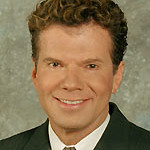 [ Hat tip and many thanks to fellow Prince of Peace Lutheran Church member Jim Jimenez, for lending me his book.]
[ Hat tip and many thanks to fellow Prince of Peace Lutheran Church member Jim Jimenez, for lending me his book.]
The title of theoretical physicist and author Michael Guillen’s book Can a Smart Person Believe in God? is actually a rhetorical question.
The author is obviously a very intelligent man as well as a professed Christian, who leaves nothing open to interpretation when he wrote: “I believe in the monotheistic God of Abraham, Isaac, and Jacob — the God of the Book. The One who created the universe.”
Furthermore, his credibility as author of this work is beyond dispute — Dr. Guillen holds a trio of PhD’s from Cornell University, in astronomy, mathematics, and physics, respectively.
Dr. Guillen also taught physics at Harvard University for eight years, and served as the ABC News science correspondent. In other words, his academic/scientist credentials are impeccable.
He explained his motives for writing it by saying:
In fact, the main reason for writing this book is not to rebut atheism (although, inevitably, I do that) but to discredit the arrogant manner in which its proponents often present and defend it — especially these days, when being cool often means coming across as sassy and self-reliant.
Probably the best word to describe Dr. Guillen (and his book) would be balanced.
His professional experience as a teacher, his training as a scientist, and his ability to articulate useful information in a conversational, easy-to-understand style combine to create a book that is concise and very easy to read.
He elaborated further on his reasons for writing this particular book:
That’s why I’ve written this book: first, to contribute some civility to the overall debate, and second, to rebut the argument that those who believe in God are dumber than those who do not. I hear this unseemly and unfounded prejudice voiced a lot these days, mainly from secular humanists who see themselves as smart, free-thinking realists and believers in God as dim-witted, superstitious sheep.
In addition to the measure of Intelligence Quotient, or IQ, in which so many secular intellectuals take great pride, Guillen devised a test to determine one’s Spiritual Quotient, or SQ, “a measure of our ability to perceive the subtler, nonphysical aspects of reality, to solve problems and acquire conviction spiritually.”
This book was obviously his reaction to “arrogant atheism,” which he eloquently summarized with an anecdote about the audacity of a fellow Harvard physics professor to describe Nobel Prize-winning physicist Robert Millikan as a “low-brow” because of his personal religious beliefs.
The irony is delicious: a professor whose most notable accomplishment was becoming a professor at a prestigious Ivy-League school, while teaching his physics class about Millikan’s famous oil-drop experiment, insulted the memory of the man who discovered every atom has an invisible electric charge.
Dr. Guillen stressed the importance of developing what he terms our need “to see with both eyes,” what he calls stereoscopic sight. To communicate these ideas, he coined a few new terms that easily communicated some very important concepts.
For example, Intellectual Cyclops are your typical atheist, in other words, people who rely only on IQ to see the world.
At the other end of the spectrum are Spiritual Cyclops, people who consider their own intellect a stumbling block in seeking God, relying strictly on a literal interpretation of the Bible, and blind faith.
According to Guillen, the Ideal Person has stereoscopic faith, striking a perfect balance between intellect and spirituality.
At the polar opposite end of the spectrum are the “blind”, people who are neither intelligent or spiritual.
Dr. Guillen gives atheists an extremely gentle rebuke, suggesting the ideal person should substitute any potential hard feelings for atheists with compassion for these reasons…
Pity the brilliant attorney with an underdeveloped SQ, for example, whose beautiful young wife is killed in a car accident, leaving him alone to raise their infant son and agonize over the seeming cruelty and capriciousness of life. Pity the brilliant but low-SQ biologist who spends her whole life studying the human retina yet has nothing to credit for its spectacular design except the supposedly fortuitous machinations of a mindless, purposeless universe. And pity the brilliant but low-SQ doctor who has no one and nothing to thank in the face of a spontaneous cure that defies all medical explanation.
So, can a smart person believe in God?
Absolutely!

[…] if anything uber-religious people, and most certainly not atheists. Modern polymath Michael Guillen has three PhDs, and he’s a Christian. The appeal to modern authority falls flat because […]